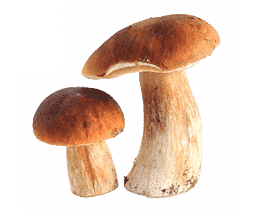“Microdosing” is the practice of consuming powerful substances in tiny amounts or doses.
In pharmaceutical terms, a microdose is the smallest effective dose that’s about 1/10 and 1/2 of the average amount.
People take the lowest possible dose to get the desired effects, like peace of mind and enhanced creativity — basically all the great benefits without triggering nasty side effects like paranoia.
These “sub-perceptual” doses tend not to result in the hallucinatory effect characteristic of shrooms.
Users microdose shrooms for a wide range of psychological and physical benefits. These include:
- Higher productivity
- Improved mood
- Increased energy and focus
- Enhanced creativity
- Lower stress and anxiety levels
As a matter of fact, individuals who microdose claim life-changing benefits like better mental health.
Take Tyler’s story for example:

Or Judith, who has previously battled anxiety and depression:

We can’t make this stuff up.
But, before we go any further, let’s learn more about psychedelic use.
Psychedelic Drug Use

Psychedelics are experiencing a renaissance of sorts, and this is after decades of being banned from scientific research.
Microdosing’s popularity can be attributed to Dr. James Fadiman’s book, The Psychedelic Explorer’s Guide, — the very first publication to go into detail on microdosing.
In his book, Dr. Fadiman shares the benefits of regular microdosing, and provides a microdosing schedule that follows a three-day cycle.
But that’s not all — this publication also includes a collection of first-hand microdosing experiences. All users seem to emphasize positive improvements in creativity, focus, and relationships.
So, exactly which psychedelics are people microdosing?
Well, the most popular psychedelic substances in use are psilocybin-containing mushrooms and lysergic acid diethylamide.
Let us walk you through LSD psilocybin.
Lysergic Acid Diethylamide (LSD)
First, this substance goes by a couple of names:
- Dots
- Acid
- Blotter
- Window pane
- Mellow yellow
- California sunshine
In its pure form, “mellow yellow” is a white, odorless, and slightly bitter crystalline powder.
It’s often sold as small squares of soaked blotting (absorbent) paper. Each square contains a single dose that’s taken by mouth — held on the tongue or swallowed.
You can also take it as a powder — which can be further made into miniature powder pellets called microdots — as capsules, or as tablets.
Lastly, you can dissolve “mellow yellow” crystals into a liquid. You can then consume this liquid in small breath-freshener droppers or apply it to various substances, including:
- Gum
- Candy
- Cookies
- Sugar cubes
- Gelatin squares
- Postage stamps
Psilocybin Mushrooms
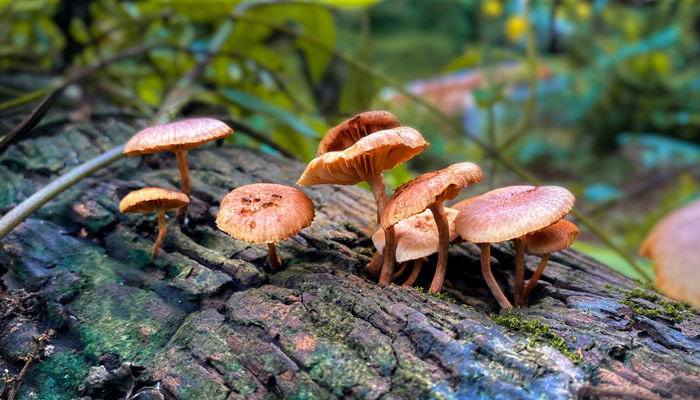
Psilocybin is a naturally occurring psychedelic compound obtained from certain mushroom species. In fact, it’s present in more than 200 species.
These mushrooms are believed to be indigenous to tropical regions in Mexico, South America, and the United States.
And, today, shrooms can also be found in good ol’ Canada.
Shrooms contain around 0.2% to 0.4% of psilocin — another psychedelic compound.
Plus, there’s more — psychedelic mushrooms have been used for spiritual and medicinal purposes in many cultures across many generations.
Shrooms are credited for managing various physical and psychological conditions, like:
- Substance addictions
- OCD
- PTSD
- ADHD
- Depression
- Anxiety
Our very own happy customer, Carl Ray, agrees:
I am living proof that mushrooms can help people with addiction issues.” —Carl Ray
The Legality of Psychedelic Microdosing
Interest in microdosing has skyrocketed over the last few years.
Take this online microdosing forum for example — at the time of the study, it had almost 40,000 subscribers. Now, it has a whopping 134,000 members and counting.
LSD and shrooms are mostly controlled substances in many countries.
For example, in the USA, LSD and psilocybin are Schedule I controlled substances. This means that they have no accepted therapeutic use.
It’s a different case in Canada, where both LSD and shrooms are Schedule III drugs.
LSD
LSD is under Schedule III of the Controlled Drugs and Substances Act.
This means activities such as the sale, possession, and production are illegal unless authorized for medical, scientific, or industrial purposes.
Magic Mushrooms
The active ingredients in shrooms, called psilocybin and psilocin, are controlled under Schedule III of the Controlled Drugs and Substances Act (CDSA), too.
This means activities such as sale, possession, production, etc. of these substances are also prohibited.
Permission is only authorized for a clinical trial or research purposes under Part J of Food and Drug Regulations.
The Science Behind Psychedelic Microdosing

At first, it may not be obvious how small doses of a drug that can make you see talking plants can increase your work performance.
But stay with us here. Psychedelic substances have the power to change the physical structure of the brain.
Let’s break it down for you.
On a regular day, the brain processes thoughts by firing electrical signals along neural pathways called synapses. But, on psychedelics, the brain’s synapses and neurons go to a whole other level, firing at a heightened rate.
During this process, the brain forms new neurons and dendrites, creating newly formed pathways.
By opening new connections between parts of your brain, these drugs can lead us into divergent thinking.
Dr. Robin Carhart-Harris and his team of researchers used brain scanning techniques to show your brain on psilocybin versus a placebo.
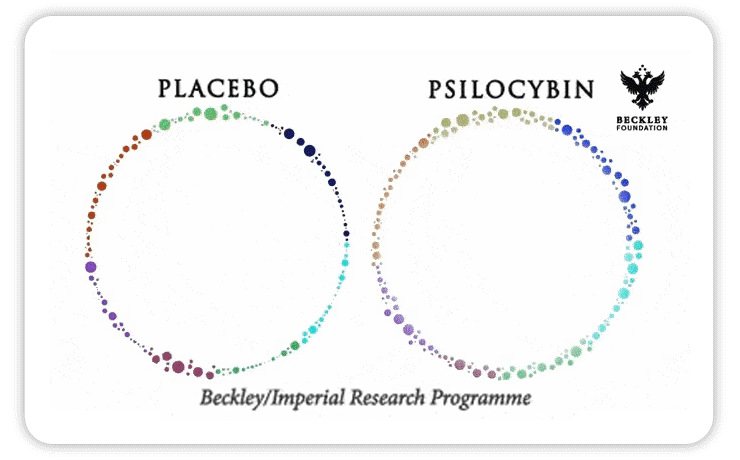
As you can see above, brain scans show more “interconnectivity” between new regions with psilocybin.
This heightened neuroplasticity can be a game-changer for patients living with depression and anxiety disorders.
How?
Psychedelics’ ability to form new neurons, dendrites, and synapses could possibly repair damaged areas in the brain.
As a result, patients may have a better quality of life by creating new thought patterns through cognitive behavioral therapy.
Meet Teresa, a Californian who works in the tech industry.
For close to a decade, Teresa battled treatment-resistant depression with no relief from traditional solutions.
She says microdosing has improved her mood, work habits, and general well being.
It’s no secret — psychedelics work wonders for depression and anxiety.
So much so that the Food and Drug Administration (FDA) granted psilocybin therapy breakthrough status for depression.
I’ve battled with social anxiety for most of my life. Microdosing psilocybin has given me the ability to connect on a deeper level with people that I never thought possible.” —Nick H.
Psilocybin-assisted psychotherapy is definitely worth looking into. And Dr. Tracey Marks, a psychiatrist, gives more insight on this below.
Microdosing Psychedelics
In 2016, the Global Drug Survey conducted a mini-survey that included 12,300 participants.
6.2% of participants reported having microdosed with LSD (10-30mcg) at least once, while 64.3% disclosed that their dosing was purely trial and error.
The participants in the latter category revealed they used fractions of LSD tablets purchased on darknet markets.
A true hazard in its own right.
To safely maximize the therapeutic benefits of shrooms, you must observe the following tips — especially if you’re a first-time user.
- Strictly purchase your shrooms from trusted sources.
- Let your doctor know you’re considering using shrooms. This is because some pre-existing conditions make it unsuitable for certain people.
- Choose to microdose because your risk-benefit analysis asserts it’s good for you. Don’t do it because everyone else is doing it.
Lots of crap out there when buying shrooms online. You can tell this site is run by professionals and they care about their product. Amazing customer service, 5 stars!” —B. S
Recommended Dosing Schedule
Dr. Fadiman’s Microdosing Method
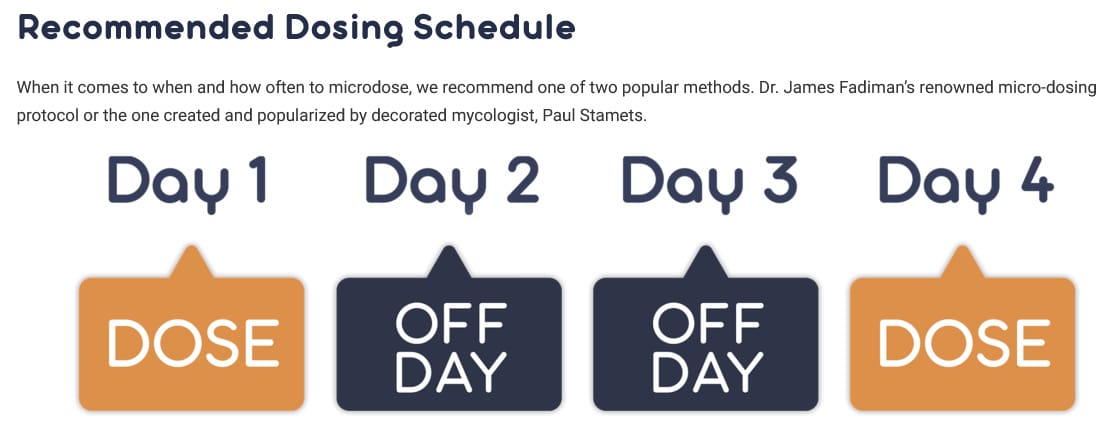
Dr. James Fadiman recommends microdosing once every 3 days to avoid developing a tolerance.
In Dr. Fadiman’s words,
The first day you feel great. The second day you would feel half of that. And the third day you won’t feel anything.”
Furthermore, to get the most benefits from microdosing, he says it’s best to stick to a plan.
Here’s a 4-week microdosing schedule you can adopt as a first-time user:
| 1 | Monday, Thursday, Sunday |
| 2 | Wednesday, Saturday |
| 3 | Tuesday, Friday |
| 4 | Monday, Thursday, Sunday |
Paul Stamet’s Microdose Schedule
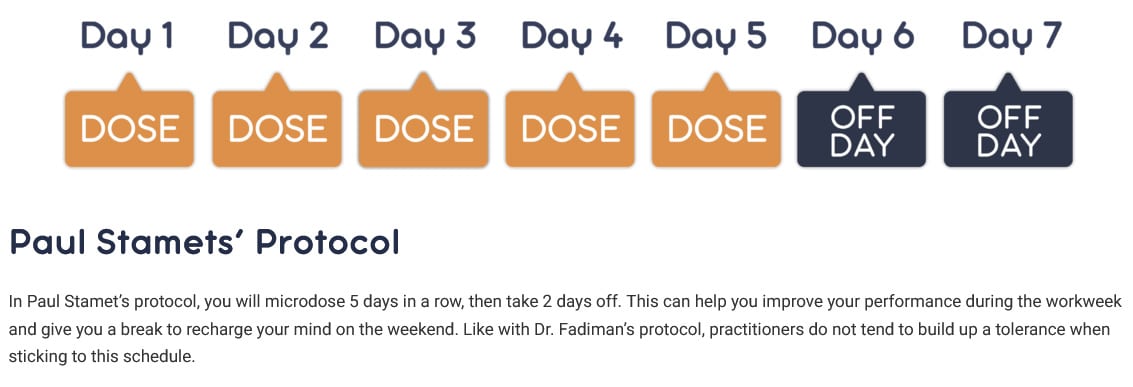
Types of Doses





What Dose Should I Take?
The choice of dose and dosing schedule varies from person to person. This is because people have different tolerance levels.
But remember, recreational use on the higher doses can quickly send you into disorienting hallucination-ville.
And we wouldn’t want you to miss out on the benefits of shrooms on the first try.
For this reason, we recommend you start at 50mg. If you feel comfortable, continue experimenting with low doses until you find your sweet spot.
- Take a capsule or two with your morning coffee
- Pop a drop or two of tincture into your smoothie
- Chomp a tasty gummy
Then, go on with your day with newfound energy, positivity, and calm.

Learn more about microdosing here.
Benefits of Microdosing
People who microdose mushrooms claim to experience an elevated mood and even more confidence in social situations.
But that’s not all — here’s a list of conditions that benefit from microdosing shrooms:
- Anxiety — general, social, academic
- No (Post-) Burning Man crash on returning home
- Creativity (technical) — coding and machine design
- Minimal use of cigarettes, coffee, Adderall, Venlafaxine
- Depression — alleviation from symptoms
- Health Habits — better food choices and sleep patterns
- Better personal insights
- Menstruation — Elimination of pain and cramping
- Migraines — fewer or eliminated
- Presence of mind
- Trauma recovery
- Procrastination
- Substantial and sustained concentration
Started micro-dosing for school since I have trouble concentrating and like wow this stuff rocks. Feels like I can stay alert for hours at a time. And have random spurts of ideas that I feel normally otherwise wouldn’t. Life-changing!” —T J Cannon
You’re probably wondering, “What does microdosing psychedelic drugs actually feel like?”
Let’s take a look at the first-hand experiences of participants in one study of psychedelic microdosing. Here are some comments from the US National Library of Medicine.
Experiences of Absorption
“I felt a lot more connected to nature, there are dogs where I am working. I’m not totally comfortable around dogs, but I sat with 3 of them a while, we were still together while they lay in the sun, I felt connected and deeply grateful for their trust and support.”
Experiences of Intense Emotions
“Microdosing has a significant impact on my ability to get in touch with what is going on deep inside. Although this is not always a pleasant experience, I have a strong feeling that psilocybin helps to reveal what I need to see in myself and the world.”
Unease About Microdosing
“On a microdose I sometimes feel weird or alien to myself and others. And another negative is that all emotions get amplified. So whenever I feel down or not loved the microdose makes it even harder.”
Plus, here’s another look at The Net Pleasure Index carried out by the Global Drug Survey.
Looks like shrooms rank significantly higher than tobacco.
However, your level of comfort with psychedelic drugs is mainly determined by their quality.
I was on the fence forever about trying Mind Mend. Mainly because I don’t do ‘drugs’. But I was running out of options and the doctor was trying to prescribe me anti-depressants. I was nervous but now I’m relieved. I feel much better now.” —Jeff Campbell
This leads us to the next section.
Frequently Asked Questions on Microdosing
Are Mind Mend Mushrooms Safe and Are They Lab Tested?
Yes! All Mind Mend products have been lab-tested, but are only effective if you consume them responsibly.
I’ve tried lots of products on the market and they seem very inconsistent when it comes to dosage and quality. Mind Mend has never let me down. Top-notch quality with consistency.”—Bruce Ingraham
I’m Taking a Prescription. Can I Microdose?
Unfortunately, there’s no concrete research on the safety of taking psychedelics alongside prescription medications.
However, it’s common knowledge that antidepressants can reduce the effects of microdosing.
Evidence also suggests combining psilocybin with lithium can result in heart problems.
For these known and other unknown reasons, we recommend that you don’t microdose alongside other recreational drugs, including alcohol.
Once again, check with your physician before microdosing shrooms.
What Are the Side Effects of Microdosing?
Side effects are commonly experienced when you consume far more than a microdose of psilocybin.
While these occurrences are rare, when they do occur, they don’t last more than a few hours.
Microdosing may also bring up difficult psychological material. This can be a good thing as it allows you to heal from certain experiences.
However, it can also be terrible if you’re not equipped to handle the sudden overflow of possibly traumatic memories.
So, we recommend having a qualified psychotherapist guiding you throughout the experience.
Do Shrooms Show Up on a Drug Test?
Mushrooms generally don’t show up on the majority of routine drug tests.
However, specific specialized tests may detect psilocybin. In this case, take note that traces of shrooms only last in your system for 24 hours.
Find more of our frequently asked questions here.
And, better yet, listen to Julianne — an experienced microdoser — answer viewer questions.
Feel the Difference

At Mind Mend, we not only produce quality products — we also walk the journey with you.

Featured Image: pixabay.com by DerWeg



